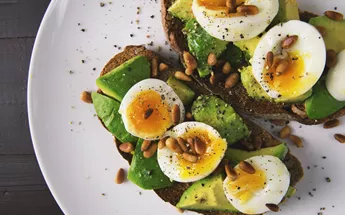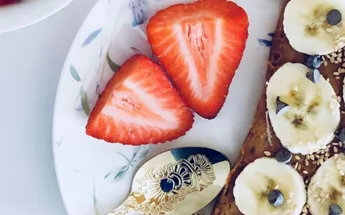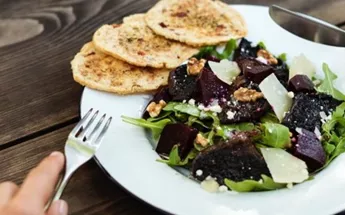Healthy eating | Creating a healthy and balanced diet
Ensuring that you eat a healthy and balanced diet is good for you and you should always try to eat a wide variety of foods to get enough essential vitamins and minerals. Below we’ve listed some ideas for ways to help you eat well and develop a nutritious diet for yourself.
Eat plenty of fruits and vegetables
It goes without saying that eating a variety of fruits and vegetables is beneficial for your health as they’re excellent sources of nutrients, vitamins, minerals and fibre. According to the British Nutrition Foundation, fruits and vegetables should count for about a third of everything we eat each day, so how do you get more into your diet?
- You can try adding bananas, berries or raisins to your cereal or porridge in the morning.
- Make vegetable soups.
- Try eating a vegetarian version of food that you like eating, for example you could try a vegetable curry, vegetarian lasagne, casseroles or vegetarian fajitas- all good ways of using up any leftovers too.
- If you’re making any sauces, add some extra vegetables and blend them in.
- Make fruit smoothies.
- Instead of snacking on crisps or biscuits, keep a fruit bowl out so you’ll be less tempted to reach for something unhealthy.
- Add a simple side salad to your dinner or lunch.
Make sure you get enough calcium and vitamin D
Calcium is essential for maintaining strong and healthy bones, muscles and teeth. Some good sources of calcium include: milk, cheese, dairy foods, tofu, nuts, bread, sardines, pilchards, soya beans and leafy green vegetables such as cabbage, broccoli and okra.
Vitamin D is also important for healthy bones, as it helps to manage calcium levels in the body. Apart from the sun and a vitamin D supplement, you can get vitamin D from egg yolks, liver, some cereals and spreads which are fortified with it, red meat, and oily fish like mackerel, sardines, pilchards and salmon.
Try adding different types of protein to your diet
Protein is essential for repairing tissues in your body and is used by your organs, muscles and skin so it’s important to ensure you’re getting enough in your diet. Diets which are high in protein can help you to maintain a healthy weight, make you feel fuller for longer and provide fuel for exercising.
Some examples of good sources of protein include prawns, chicken, turkey, pork, eggs, milk, yoghurt, almonds, pistachios, cashew nuts, oats, cottage cheese, broccoli, tuna, quinoa, lentils, pumpkin seeds, peanuts and Brussel sprouts…plus many more.
Increase your fibre intake
Fibre is important for our digestion and bowel movements. Eating a diet that is rich in fibre has many health benefits including lowering the risk of heart disease, diabetes and bowel cancer. Eating fibrous foods can also help us to feel fuller for longer and help prevent constipation.
Increasing your fibre intake can come from a variety of food sources including porridge, oats, Weetabix, Shredded Wheat, granary breads, wholegrain pastas, brown rice, beans, lentils, chickpeas, and fresh fruits and vegetables.
Choose good fats
Fat is an essential part of our diet, but making sure we choose the right ones is equally as important. Fat provides our bodies with energy, helps support cell growth and keeps our skin and hair healthy. It’s also essential for insulating our bodies to help keep us warm.
It’s important that we choose the right types of fat, as there are some that can raise your cholesterol and some that can help lower it. Some examples of foods which are good for us but are high in fat are avocado, dark chocolate, eggs, oily fish, chia seeds, nuts, flaxseeds, olives, tofu and full-fat yoghurt.
Pick your carbs wisely
Not all carbs are bad, in fact they play an important part in a balanced diet because your body uses carbohydrates as its main source of fuel. There are three different types of carbs; sugar, starch and fibre.
Healthy carbs include fruits and vegetables, whole grain foods like brown rice, sweet potatoes, peas, beans, lentils, kidney beans, chia seeds, oats, nuts, pumpkin seeds, quinoa and potatoes.
The bottom line is that you should still enjoy the things you eat, but everything in moderation, and ensure you eat a variety of different types of food to ensure you’re getting all of the vitamins and nutrients your body requires.
Next steps
Tips to improve nutrition in older people
Older people are more susceptible to malnutrition which is why it's important to ensure we all eat a varied and balanced diet. We list some ways to help improve nutrition in older people.
Healthy eating and nutrition
Eating healthily is important for all of us no matter what stage of life we’re in, however ensuring you have plenty of nutritious foods in your diet throughout later life will help you stay active and healthy for longer.
Top tips for eating well on a budget
Think you can’t eat healthily on a budget? Think again! We’ve listed the top tips for how you can make the most of your money and eat well on a budget.


